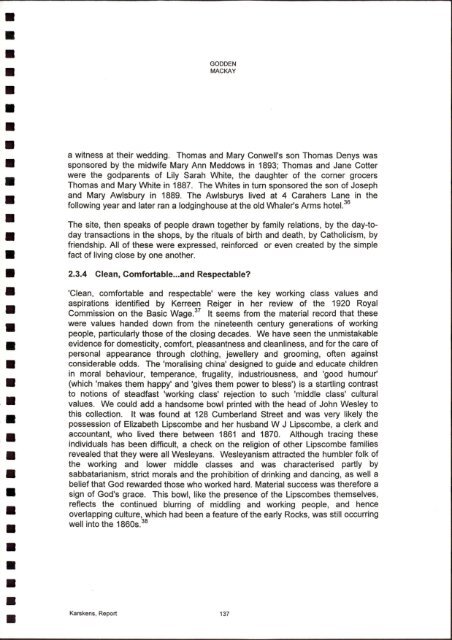Private Pleasures
Private Pleasures
Private Pleasures
Create successful ePaper yourself
Turn your PDF publications into a flip-book with our unique Google optimized e-Paper software.
GODDEN<br />
MACKAY<br />
a witness at their wedding. Thomas and Mary Conwell's son Thomas Denys was<br />
sponsored by the midwife Mary Ann Meddows in 1893; Thomas and Jane Cotter<br />
were the godparents of Lily Sarah White, the daughter of the corner grocers<br />
Thomas and Mary White in 1887. The Whites in turn sponsored the son of Joseph<br />
and Mary Awlsbury in 1889. The Awlsburys lived at 4 Carahers Lane in the<br />
following year and later ran a lodging house at the old Whaler's Arms hotel. 36<br />
The site, then speaks of people drawn together by family relations, by the day-today<br />
transactions in the shops, by the rituals of birth and death, by Catholicism, by<br />
friendship. All of these were expressed, reinforced or even created by the simple<br />
fact of living close by one another.<br />
2.3.4 Clean, Comfortable ... and Respectable?<br />
'Clean, comfortable and respectable' were the key working class values and<br />
aspirations identified by Kerreen Reiger in her review of the 1920 Royal<br />
Commission on the Basic Wage. 37<br />
It seems from the material record that these<br />
were values handed down from the nineteenth century generations of working<br />
people, particularly those of the closing decades. We have seen the unmistakable<br />
evidence for domesticity, comfort, pleasantness and cleanliness, and for the care of<br />
personal appearance through clothing, jewellery and grooming, often against<br />
considerable odds. The 'moralising china' designed to guide and educate children<br />
in moral behaviour, temperance, frugality, industriousness, and 'good humour'<br />
(which 'makes them happy' and 'gives them power to bless') is a startling contrast<br />
to notions of steadfast 'working class' rejection to such 'middle class' cultural<br />
values. We could add a handsome bowl printed with the head of John Wesley to<br />
this collection. It was found at 128 Cumberland Street and was very likely the<br />
possession of Elizabeth Lipscombe and her husband W J Lipscombe, a clerk and<br />
accountant, who lived there between 1861 and 1870. Although tracing these<br />
individuals has been difficult, a check on the religion of other Lipscombe families<br />
revealed that they were all Wesleyans. Wesleyanism attracted the humbler folk of<br />
the working and lower middle classes and was characterised partly by<br />
sabbatarianism, strict morals and the prohibition of drinking and dancing, as well a<br />
belief that God rewarded those who worked hard. Material success was therefore a<br />
sign of God's grace. This bowl, like the presence of the Lipscombes themselves,<br />
reflects the continued blurring of middling and working people, and hence<br />
overlapping culture, which had been a feature of the early Rocks, was still occurring<br />
well into the 1860s. 38<br />
Karskens, Report 137




